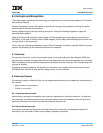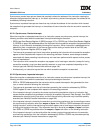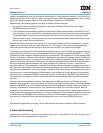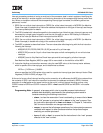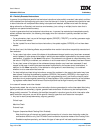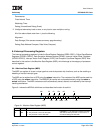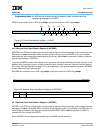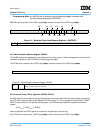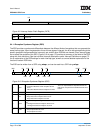
User’s Manual
Preliminary PPC440x5 CPU Core
intrupts.fm.
September 12, 2002
Page 165 of 589
Decrementer
Fixed-Interval Timer
Watchdog Timer
Debug (Unconditional Debug Event)
2. Unaligned elementary load or store, or any load or store multiple or string:
All of the above listed under item 1, plus the following:
Alignment
Data Storage (if the access crosses a memory page boundary)
Debug (Data Address Compare, Data Value Compare)
6.4 Interrupt Processing Registers
The interrupt processing registers include the Save/Restore Registers (SRR0–SRR1), Critical Save/Restore
Registers (CSRR0–CSRR1), Data Exception Address Register (DEAR), Interrupt Vector Offset Registers
(IVOR0–IVOR15), Interrupt Vector Prefix Register (IVPR), and Exception Syndrome Register (ESR). Also
described in this section is the Machine State Register (MSR), which belongs to the category of processor
control registers.
6.4.1 Machine State Register (MSR)
The MSR is a register of its own unique type that controls important chip functions, such as the enabling or
disabling of various interrupt types.
The MSR can be written from a GPR using the mtmsr instruction. The contents of the MSR can be read into
a GPR using the mfmsr instruction. The MSR[EE] bit can be set or cleared atomically using the wrtee or
wrteei instructions. The MSR contents are also automatically saved, altered, and restored by the interrupt-
handling mechanism.
Figure 6-1 shows the MSR bit definitions and describes the function of each bit.
Figure 6-1. Machine State Register (MSR)
0:12 Reserved
13 WE
Wait State Enable
0 The processor is not in the wait state.
1 The processor is in the wait state.
If MSR[WE] = 1, the processor remains in the wait
state until an interrupt is taken, a reset occurs, or
an external debug tool clears WE.
0 12 13 14 15 16 17 18 19 20 21 22 23 24 25 26 27 28 31
FE1
WE
PR
DS
CE
EE
DE
FP
ME
DWE
FE0
IS





